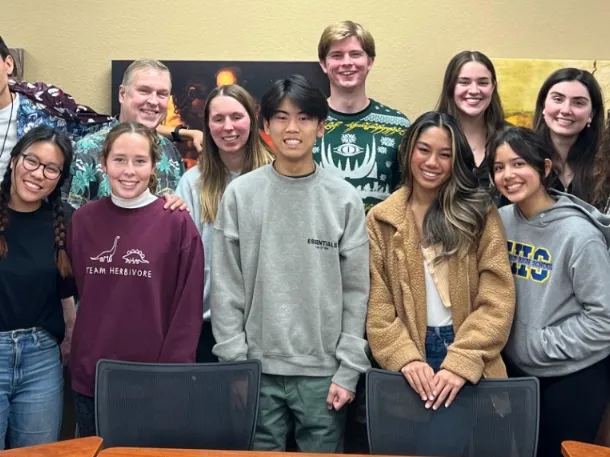- Home
- >
- APU Articles
- >
- News Article
The Freshmen Honors Experience: Transforming Together
January 17, 2023 | Category Honors College | Written By Nathan Foster and Walter Cabal

Over the course of their first semester, the students read an astonishing amount of great works from authors such as Aristotle, Mencius, Erasmus, Martin Luther King, Jr., Sun Zi, William Shakespeare, and several books of the Bible. After reflecting on all he read, Heath Koranda ’26 decided Erasmus’ The Education of a Christian Prince was the most influential for him. “I loved it because he established Christ as the ultimate standard that every leader should aspire to, but he also added supplementary wisdom from human thinkers,” he said. “The uniting of those two makes for an amazing leadership guide.” While Abigail Tam ’26 appreciated Erasmus, she contended that King’s Strength to Love was the most impactful. “MLK’s wisdom was so powerful,” Tam said. “It convicted me to truly follow Jesus’ example and live as a witness of Christ.” Nadia Ibarra ’26 expressed a similar sentiment, “God has shown Himself to me through what I learned in the Honors College. Being able to see His work was a life changing experience, and it affirmed my faith in Him.”
While academic growth is an integral part of honors, building a community outside the classroom is also a fundamental component of the students’ learning experience. Mia Guillen ’26 shared that “listening to others rather than relying solely on myself made it a lot easier to tackle difficult readings, such as Aristotle.” Tam affirmed the value of learning from her peers. “The relationships I built gave me the freedom to express and debate different ideas and beliefs,” she said. “It has been so refreshing to discuss polarizing subjects in a friendly manner.” Koranda compared the friends he made in honors to the friendships of virtue described in Aristotle’s Nicomachean Ethics. “Friends of virtue sharpen and want the best for each other. I've definitely felt that here,” he said. “I love deep and real conversations. Having these purposeful discussions with other like-minded people is such an amazing opportunity.”
Ultimately the Honors College prepares students to continue developing their intellect, character, and faith for the common good. “My dream, God willing, is to become a surgeon. I’d like to open up a hospital in a disadvantaged area—there are some places where the nearest hospital is more than 50 miles away,” Rami Ezzeddine ’26 shared. “Honors College has prepared me for that career path because in health care, you’re going to be helping a lot of people from different backgrounds.” Modern culture can tend to be self-orbiting, but the honors curriculum encourages students to consider a variety of perspectives in order to impact the lives of others. Koranda recalled Erasmus’ compelling notion of a “leader that takes up burdens to ensure the safety and wellbeing of others even at the expense of their own comfort. This idea is so powerful to me.”
Just four months after that first colloquy, the students gathered together for their last class of the semester. Though they sat in the same seats, they approached their final conversation in a much different way. As the freshmen devoured donuts and Crumbl Cookies, they recollected the formative parts of the semester. The students shed tears of joy and their bouts of laughter echoed down the hall as they shared the impact they had on each other. “Growing up, I was homeschooled. You were the friends I always wanted to have,” Tam said. “Thank you all for giving me the best school experience of my life.” Koranda seconded Tam’s sentiments, describing how much he enjoyed being with his classmates in the honors setting. “I never knew this kind of life was possible, an immersion in great people, great books, and great conversation,” he said. “It is my life now, and I truly cannot believe it. I am so happy that I am living that life at APU.” Koranda said he is sad that this semester in Weeks’ colloquy is over, but he is excited for the next seven semesters in honors. “This journey is one that I am absolutely sure will transform me.”